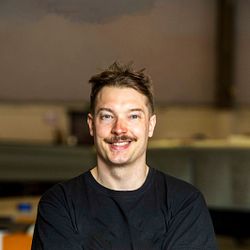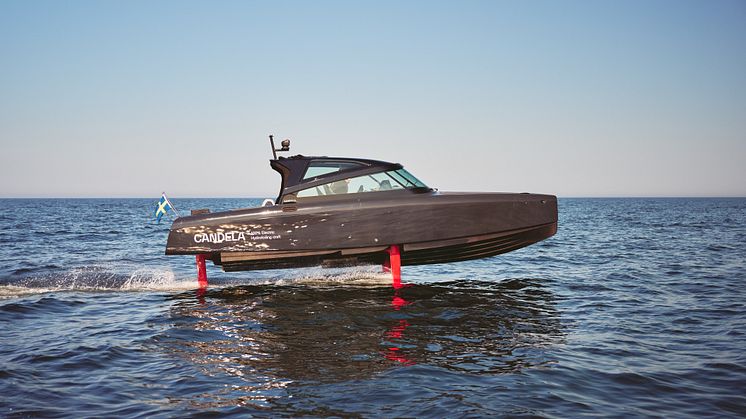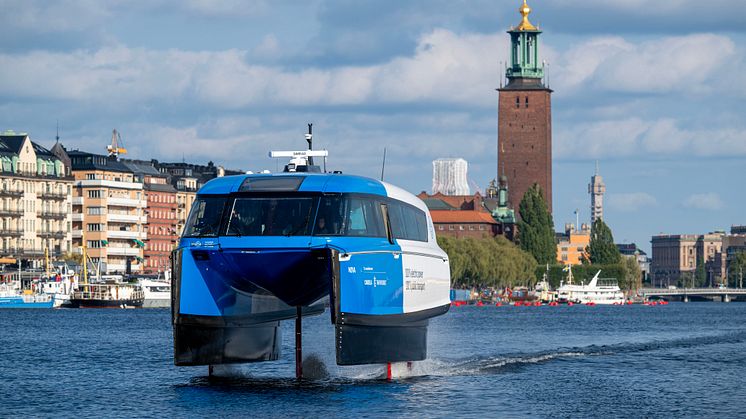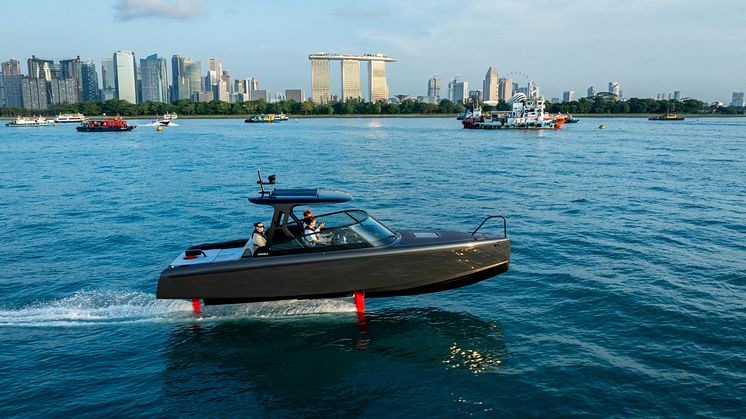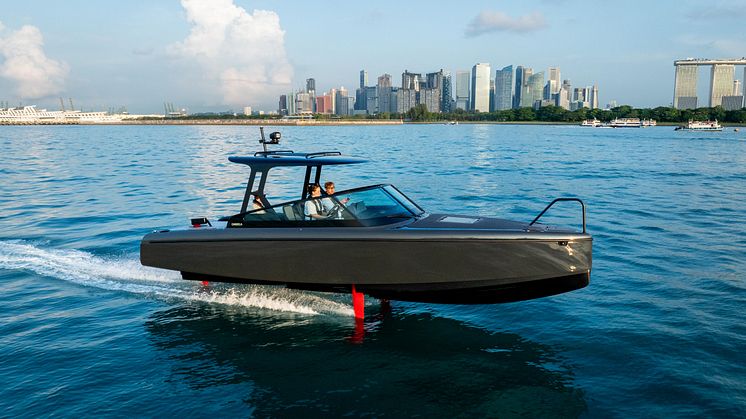
Press release -
'Game-Changing' Electric Hydrofoil Boat Debuts in Auckland
Friday, February 28, 2025
Auckland will host the New Zealand debut of the Candela C-8, the world’s best-selling electric hydrofoil boat.
The C-8 will also showcase the cutting-edge technology behind New Zealand’s first electric foiling ferry, which Candela is set to deliver.
Ferries contribute significantly to Auckland’s transport emissions—something Candela’s technology can help mitigate.
(Media demos available)
The Candela C-8—the fastest, longest-range, most silent, and most efficient electric foiling boat on the market—will make its New Zealand debut at the Auckland Boat Show, brought to the country by Carbon Yachts.
Stockholm-based Candela is the global leader in electric hydrofoil vessels, both for leisure and commercial use. Since 2016, the company has delivered over 100 vessels. The C-8 has been hailed as a 'game changer' thanks to its innovative hydrofoil system, which lifts the hull above water, reducing energy consumption by 80% while enabling long range and high speeds.
The C-8 has set multiple world records, including the first international crossing in an electric boat and the longest distance covered by an electric vessel in a single day—423 nautical miles.
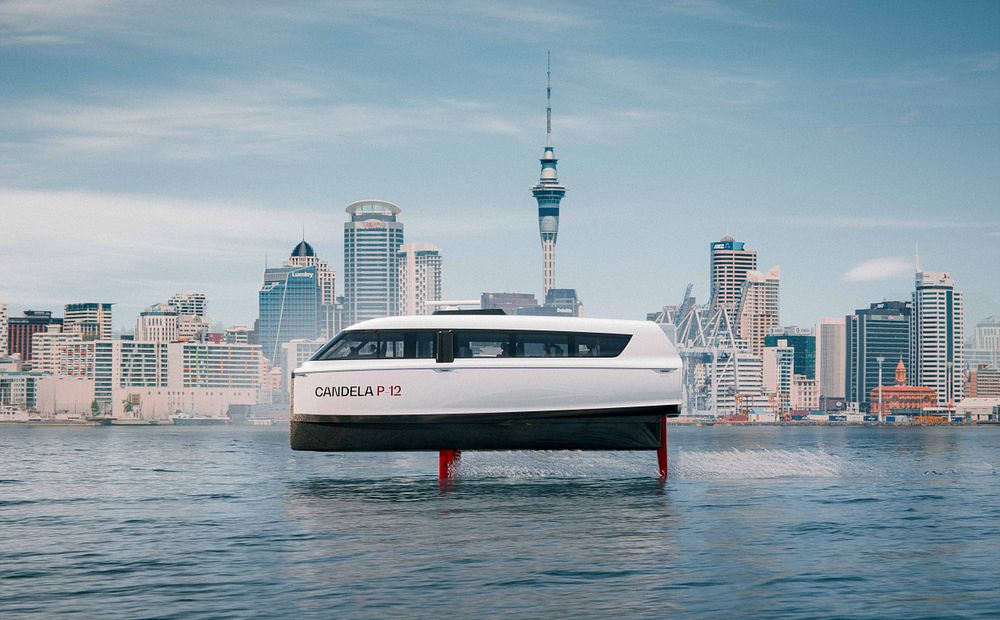
Candela will also deliver New Zealand's first electric hydrofoil ferry, the Candela P-12 - which already is in operation in Stockholm.
Flying above the waves, it offers a completely silent ride, thanks to its direct-drive, fully submerged Candela C-POD motor. It operates without a mechanical transmission, making it maintenance-free while eliminating the need for oil or cooling fluid.
At the heart of the vessel is the Flight Controller, a digital system that uses a variety of sensors to maintain flight height, pitch, and roll, ensuring a stable ride even in waves and wind.
"It’s an experience like no other. It’s akin to a magic carpet ride—silent, smooth, and stable. You can have a normal conversation with passengers, and since the boat doesn’t roll or pitch, you won’t get seasick," says Gustav Hasselskog, CEO and founder of Candela, who is in Auckland for the launch. He is also there to discuss New Zealand’s first foiling electric ferry, which Candela is set to deliver.
Flying Ferries Can Fix Auckland’s Transport Challenges
As announced in 2024, New Zealand power company Meridian will take delivery of a Candela P-12, the world’s first electric foiling ferry, which was introduced last year.
The 30-passenger P-12 is already in service in Stockholm’s public transport system, where it has been a major success, cutting commute times in half with its 25-knot cruising speed. The vessel has also received an exemption from speed limits in Stockholm’s city center, as its hydrofoils eliminate wave damage. So far, every departure has been fully booked, and the P-12 has demonstrated a 95% reduction in carbon dioxide emissions per passenger kilometer compared to conventional ferries.
Designed for efficient mass transport, the P-12 offers easy boarding through a wide bow ramp, accommodating passengers with strollers, bikes, and wheelchairs. Flying above the waves, it delivers a smooth and silent ride while also significantly reducing operational costs, making it an attractive option for operators looking to transition to zero-emission vessels.
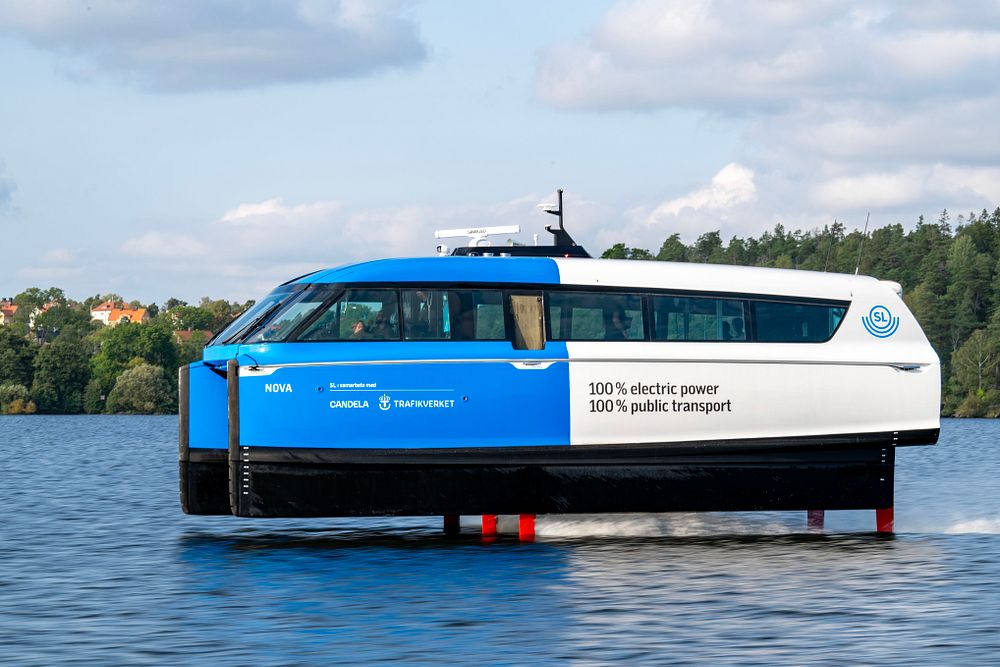
Candela P-12, operating in Stockholm's public transport since fall 2024, halves travel times for commuters.
Auckland’s ferry network plays a vital role in the city's public transport system, and as congestion on roads worsens, the need for fast, efficient, and sustainable transport alternatives has never been greater. But despite carrying only 6% of passengers, ferries today account for 20% of public transport emissions, consuming up to 13 million litres of diesel per year. Traditional ferries are not only carbon-intensive but also costly to operate and maintain, limiting the feasibility of expanding waterborne transport.
Additionally, speed restrictions due to wake generation slow down ferry routes, making them less competitive with road-based commuting.
"New Zealand is a trailblazer in foiling, especially with the America's Cup, so we are thrilled to deliver the country’s first foiling electric ferry. We believe the P-12 has great potential for transport in Auckland, which is why we’re excited to showcase our technology here," says Gustav Hasselskog.
For media inquiries regarding interviews with Gustav Hasselskog, please contact:
mikael.mahlberg@candela.com
+46765376678
Conact Carbon Yachts regarding C-8 in New Zealand
+61 (02) 9979 6612
Pittwater, Sydney, Gold Coast, Perth, Melbourne, Auckland
Related links
Topics
Stockholm-based Candela Technology AB is the world leader in hydrofoiling electric vessels. The company was founded in 2014 by engineer and business leader Gustav Hasselskog with the mission to accelerate the world's transition to fossil fuel-free lakes and oceans by developing electric vessels that outperform those powered by fossil fuels.
Candela's watercraft have wings (hydrofoils) that lift the hull above the water and reduce friction, using 80% less energy than conventional ships at high speed. This technology allows for long-range water travel solely on battery power, a first in the industry. Candela's hydrofoils also enable operators to transition to sustainable fleets by providing up to 50% lower operational costs.
At the heart of Candela's hydrofoil tech stack is the Flight controller, which automatically stabilizes the vessel during flight by regulating the foils, using sensors that gauge wave height and wind speed, among other factors. Even in rough weather, passengers experience 90% less g-forces than they would on a traditional boat. All Candela vessels are fully connected and receive over-the-air updates.
After five years of research and development, Candela began producing the world's first electric hydrofoil leisure boat in 2019, the Candela C-7 open "roadster of the seas". This was followed in 2022 by the high-volume market Candela C-8, which was delivered to the first customers in spring 2023. Over 150 C-8 units have been sold to date, and the vessel has been lauded as a "game changer" by Motorboat and Yachting magazine, winning numerous awards including the 2022 European Powerboat of the Year award for its superior seakeeping, long range, and high speed.
In 2023, Candela launched its first commercial vessel, the Candela P-12 Shuttle ferry. It is the fastest and longest-range electric ship ever built, with a top speed of 30 knots and a range of 40 nautical miles at 25 knots. It is also the most energy-efficient fast ship ever made in its size class. Substantial operational cost savings are expected. The first unit enters service in Stockholm's public transport system in 2024.
Candela is a technology company with headquarters in Stockholm, Sweden, employing over 200 engineers, technicians, and production staff. The company develops the entire tech stack, from the C-POD motor to the control system and carbon fiber hulls, in-house. Candela's two wholly-owned factories in Stockholm, Sweden, produce the Candela C-8 and P-12 vessels. The company also has leisure boat resellers in 12 countries and wholly-owned sales offices in San Francisco, USA, and Cannes, France.

